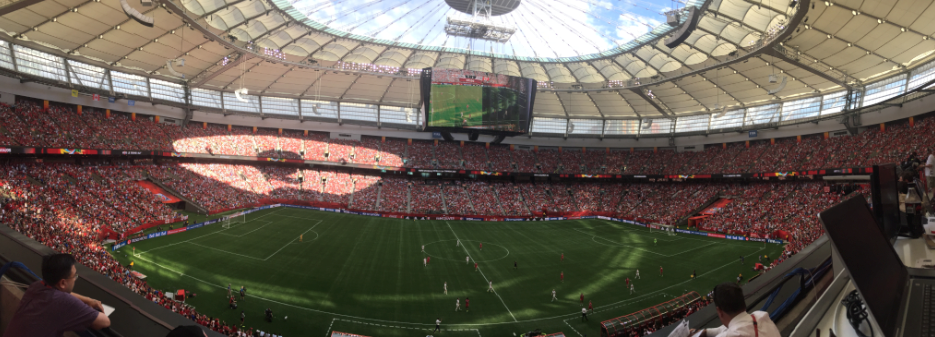The Canadian Soccer Association (CSA) reported almost $107 million revenue in 2015, of which $82 million was from hosting the FIFA Women’s World Cup.
The numbers are contained in the CSA’s annual audited financial report through December 31. It was released to Business in Vancouver by the Canada Revenue Agency’s Charities Directorate. (See below for documents.)
CSA president Victor Montagliani pledged last April that the non-profit, which boasts 823,450 registered players, would publish its 2015 report.
The CSA website does not contain the PwC-audited report. Instead, it shows the 50-page Canada Soccer 2015 Annual Report that includes two pages under the heading “Financials,” but not a single dollar amount for revenue or expenses.
The audited financials show CSA reported $11.8 million net revenue after $95 million expenses. That was a turnaround from 2014, when the CSA was $8.3 million in the red during the year it hosted the Women’s Under-20 World Cup.
The Women’s World Cup was the CSA’s biggest 2015 expense ($72 million). Sponsorships and donations ($8.5 million), registration fees charged to players ($7.7 million) and grants from federal taxpayers through Sport Canada ($3 million) were the three biggest non-Women’s World Cup revenue sources.
The CSA also counted $2.8 million in gate receipts and $1.4 million in grants from FIFA and CONCACAF.
During the Women’s World Cup year, merchandise and royalties revenue fell to $143,000 from $156,000, but sponsorship increased $3 million.
On the expense side of the ledger, the CSA spent $8.3 million on senior teams, but the report does not show the breakdown between women’s and men’s teams.
It also spent a combined $5 million on marketing, communications, administration and meetings.
The CSA counted $6.5 million in accounts receivable, of which $3.25 million was owed from two unidentified debtors. The financial reports do not include compensation for senior executives. Montagliani said last April that those figures would remain confidential.
In May, Montagliani became president of CONCACAF, the FIFA affiliate for the North and Central American and Caribbean zone. Three of his CONCACAF predecessors were banned by FIFA for corruption.
Neither Montagliani, an executive with Shaw Sabey insurance, nor vice-president Steve Reed, a chartered professional accountant with Manning Elliott, responded to BIV interview requests.

In a May survey of national sports organizations, BIV found the CSA, Hockey Canada and Canada Basketball were among the minority that don’t disclose their reports to the public.
Athletics Canada, Own the Podium and Rugby Canada publish theirs and so do the U.S. soccer, hockey and basketball organizations.
Former CSA board member Amelia Salehabadi-Fouques said there is no excuse for it to be so secretive. “The people in that organization don’t take seriously their jobs.”
“For me it was never transparent enough,” the Montreal lawyer told BIV. “The financial statements were incomplete when they were presented to us or at the last minute. I felt I never had enough information and, when I used to ask questions, Steve and Victor would get all upset.”
Meanwhile, Hockey Canada reported a $9.4 million surplus for the year ended June 30, 2015, more than double the previous year’s $4.3 million surplus.
It reported $22 million in marketing revenue and $12.5 million in insurance premiums. Administration cost $18.5 million and high performance programs were $11 million. Hockey Canada also reported holding long-term investments with a $70.8 million market value.
Canada Basketball’s report for the year ended March 31, 2015, showed $7.9 million revenue, $7 million expenses and an $836,594 surplus.
Sponsorship and marketing ($2.6 million) and Sport Canada and the Canadian Sport Institute ($2.37 million) were its biggest income sources. High performance national teams ($2.9 million) and Canadian Wheelchair Basketball Association ($1.9 million) were the biggest expenses.
2015-12-31_122473473RR0001_FS_Redacted by BobMackin on Scribd




